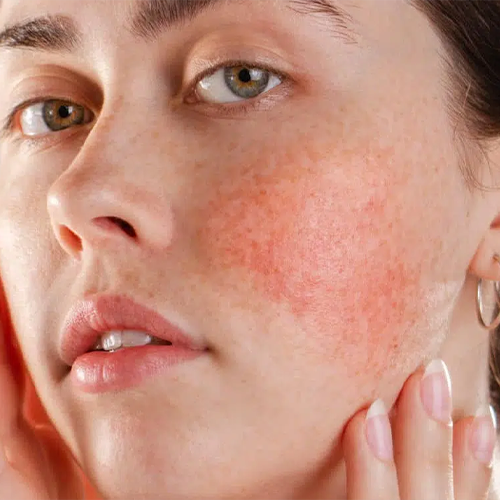Rosacea is a common skin condition that primarily affects the face, causing redness, visible blood vessels (telangiectasia), and sometimes small, red, pus-filled bumps. While rosacea is not directly related to the veins, the visible blood vessels (telangiectasia) associated with rosacea can give the appearance of red veins on the skin.
The exact cause of rosacea is not fully understood, but factors such as genetics, environmental triggers, and an abnormal immune response are believed to play a role. Common symptoms of rosacea include:
Persistent redness: Redness on the central part of the face, often resembling a sunburn.
Flushing: Episodes of facial redness, often triggered by various factors such as spicy foods, hot drinks, alcohol, temperature changes, or emotional stress.
Visible blood vessels: Small, dilated blood vessels (telangiectasia) may become visible on the skin.
Papules and pustules: Small red bumps and pus-filled pimples may develop, resembling acne.
Thickened skin: In some cases, the skin on the nose may become thickened and bulbous, a condition known as rhinophyma.

Treatment for rosacea typically involves managing symptoms and triggers. Here are some general approaches:
Topical medications: Prescription creams or gels containing ingredients like metronidazole, azelaic acid, or ivermectin can help reduce redness and inflammation.
Oral antibiotics: In some cases, oral antibiotics (such as doxycycline or minocycline) may be prescribed to control inflammation and reduce symptoms.
Laser therapy: Intense pulsed light (IPL) or laser treatments can target blood vessels, reducing redness and visible veins.
Avoiding triggers: Identifying and avoiding triggers that worsen symptoms, such as certain foods, alcohol, or extreme temperatures, can help manage rosacea.
Gentle skincare: Using a gentle skincare routine with mild, non-irritating products can help avoid aggravating the skin.
If you are experiencing symptoms of rosacea or concerns about visible blood vessels, it is advisable to consult with a dermatologist. They can provide a proper diagnosis and recommend a tailored treatment plan based on the specific characteristics of your skin and the severity of your condition.

ABOUT
Dr.Aiza
Dr Aiza Jamil is a one of the leading UK trained Consultant Dermatologist, laser and aesthetics. Dr Aiza Jamil did her dermatology training in Sheffield and works as Consultant Dermatologist in Manchester University Hospitals providing services to UK’s largest hospital, Manchester Royal Infirmary. She has also completed American Board Diplomate Certification in medical and cosmetic lasers from American Board of Laser Surgery making her unique in having both UK and USA qualifications.
Frequently Asked Question
What Is The Best Treatment For Rosacea Veins?
Laser therapy, IPL (intense pulsed light) therapy, and sclerotherapy are the most effective treatments for rosacea veins.
Can A Dermatologist Help With Veins On The Face?
Yes, dermatologists can provide various treatments to help reduce the appearance of veins on the face, including rosacea veins.
Can You Get Rid Of Rosacea Veins?
While rosacea veins cannot be permanently eliminated, treatments such as laser therapy and IPL can significantly reduce their appearance.
What Happens If You Ignore Rosacea?
Ignoring rosacea can worsen symptoms, including persistent redness, visible blood vessels, and flare-ups of inflammation and irritation.
Why Am I Suddenly Getting Rosacea?
The exact cause of rosacea is unknown, but factors such as genetics, environmental triggers (like sunlight and certain foods), and an abnormal immune response may contribute to its development.


